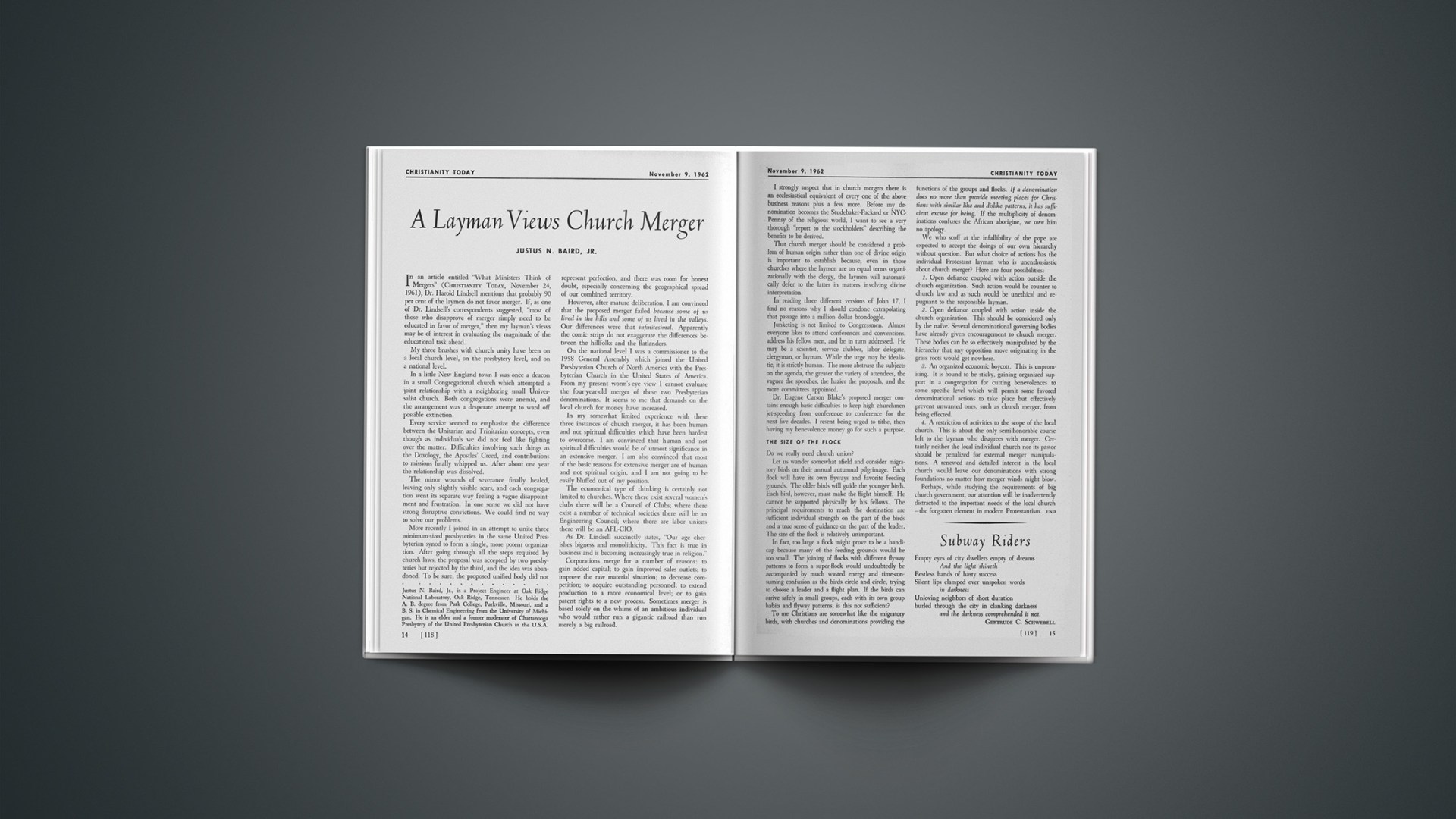In an article entitled “What Ministers Think of Mergers” (CHRISTIANITY TODAY, November 24, 1961), Dr. Harold Lindsell mentions that probably 90 per cent of the laymen do not favor merger. If, as one of Dr. Lindsell’s correspondents suggested, “most of those who disapprove of merger simply need to be educated in favor of merger,” then my layman’s views may be of interest in evaluating the magnitude of the educational task ahead.
My three brushes with church unity have been on a local church level, on the presbytery level, and on a national level.
In a little New England town I was once a deacon in a small Congregational church which attempted a joint relationship with a neighboring small Universalist church. Both congregations were anemic, and the arrangement was a desperate attempt to ward off possible extinction.
Every service seemed to emphasize the difference between the Unitarian and Trinitarian concepts, even though as individuals we did not feel like fighting over the matter. Difficulties involving such things as the Doxology, the Apostles’ Creed, and contributions to missions finally whipped us. After about one year the relationship was dissolved.
The minor wounds of severance finally healed, leaving only slightly visible scars, and each congregation went its separate way feeling a vague disappointment and frustration. In one sense we did not have strong disruptive convictions. We could find no way to solve our problems.
More recently I joined in an attempt to unite three minimum-sized presbyteries in the same United Presbyterian synod to form a single, more potent organization. After going through all the steps required by church laws, the proposal was accepted by two presbyteries but rejected by the third, and the idea was abandoned. To be sure, the proposed unified body did not represent perfection, and there was room for honest doubt, especially concerning the geographical spread of our combined territory.
However, after mature deliberation, I am convinced that the proposed merger failed because some of us lived in the hills and some of us lived in the valleys. Our differences were that infinitesimal. Apparently the comic strips do not exaggerate the differences between the hillfolks and the flatlanders.
On the national level I was a commissioner to the 1958 General Assembly which joined the United Presbyterian Church of North America with the Presbyterian Church in the United States of America. From my present worm’s-eye view I cannot evaluate the four-year-old merger of these two Presbyterian denominations. It seems to me that demands on the local church for money have increased.
In my somewhat limited experience with these three instances of church merger, it has been human and not spiritual difficulties which have been hardest to overcome. I am convinced that human and not spiritual difficulties would be of utmost significance in an extensive merger. I am also convinced that most of the basic reasons for extensive merger are of human and not spiritual origin, and I am not going to be easily bluffed out of my position.
The ecumenical type of thinking is certainly not limited to churches. Where there exist several women’s clubs there will be a Council of Clubs; where there exist a number of technical societies there will be an Engineering Council; where there are labor unions there will be an AFL-CIO.
As Dr. Lindsell succinctly states, “Our age cherishes bigness and monolithicity. This fact is true in business and is becoming increasingly true in religion.”
Corporations merge for a number of reasons: to gain added capital; to gain improved sales outlets; to improve the raw material situation; to decrease competition; to acquire outstanding personnel; to extend production to a more economical level; or to gain patent rights to a new process. Sometimes merger is based solely on the whims of an ambitious individual who would rather run a gigantic railroad than run merely a big railroad.
I strongly suspect that in church mergers there is an ecclesiastical equivalent of every one of the above business reasons plus a few more. Before my denomination becomes the Studebaker-Packard or NYC-Pennsy of the religious world, I want to see a very thorough “report to the stockholders” describing the benefits to be derived.
That church merger should be considered a problem of human origin rather than one of divine origin is important to establish because, even in those churches where the laymen are on equal terms organizationally with the clergy, the laymen will automatically defer to the latter in matters involving divine interpretation.
In reading three different versions of John 17, I find no reasons why I should condone extrapolating that passage into a million dollar boondoggle.
Junketing is not limited to Congressmen. Almost everyone likes to attend conferences and conventions, address his fellow men, and be in turn addressed. He may be a scientist, service clubber, labor delegate, clergyman, or layman. While the urge may be idealistic, it is strictly human. The more abstruse the subjects on the agenda, the greater the variety of attendees, the vaguer the speeches, the hazier the proposals, and the more committees appointed.
Dr. Eugene Carson Blake’s proposed merger contains enough basic difficulties to keep high churchmen jet-speeding from conference to conference for the next five decades. I resent being urged to tithe, then having my benevolence money go for such a purpose.
The Size Of The Flock
Do we really need church union?
Let us wander somewhat afield and consider migratory birds on their annual autumnal pilgrimage. Each flock will have its own flyways and favorite feeding grounds. The older birds will guide the younger birds. Each bird, however, must make the flight himself. He cannot be supported physically by his fellows. The principal requirements to reach the destination are sufficient individual strength on the part of the birds and a true sense of guidance on the part of the leader. The size of the flock is relatively unimportant.
In fact, too large a flock might prove to be a handicap because many of the feeding grounds would be too small. The joining of flocks with different flyway patterns to form a super-flock would undoubtedly be accompanied by much wasted energy and time-consuming confusion as the birds circle and circle, trying to choose a leader and a flight plan. If the birds can arrive safely in small groups, each with its own group habits and flyway patterns, is this not sufficient?
To me Christians are somewhat like the migratory birds, with churches and denominations providing the functions of the groups and flocks. If a denomination does no more than provide meeting places for Christians with similar like and dislike patterns, it has sufficient excuse for being. If the multiplicity of denominations confuses the African aborigine, we owe him no apology.
We who scoff at the infallibility of the pope are expected to accept the doings of our own hierarchy without question. But what choice of actions has the individual Protestant layman who is unenthusiastic about church merger? Here are four possibilities:
1. Open defiance coupled with action outside the church organization. Such action would be counter to church law and as such would be unethical and repugnant to the responsible layman.
2. Open defiance coupled with action inside the church organization. This should be considered only by the naïve. Several denominational governing bodies have already given encouragement to church merger. These bodies can be so effectively manipulated by the hierarchy that any opposition move originating in the grass roots would get nowhere.
3. An organized economic boycott. This is unpromising. It is bound to be sticky, gaining organized support in a congregation for cutting benevolences to some specific level which will permit some favored denominational actions to take place but effectively prevent unwanted ones, such as church merger, from being effected.
4. A restriction of activities to the scope of the local church. This is about the only semi-honorable course left to the layman who disagrees with merger. Certainly neither the local individual church nor its pastor should be penalized for external merger manipulations. A renewed and detailed interest in the local church would leave our denominations with strong foundations no matter how merger winds might blow.
Perhaps, while studying the requirements of big church government, our attention will be inadvertently distracted to the important needs of the local church—the forgotten element in modern Protestantism.
Subway Riders
Empty eyes of city dwellers empty of dreams
And the light shineth
Restless hands of hasty success
Silent lips clamped over unspoken words
in darkness
Unloving neighbors of short duration
hurled through the city in clanking darkness
and the darkness comprehended it not.
GERTRUDE C. SCHWEBELL










